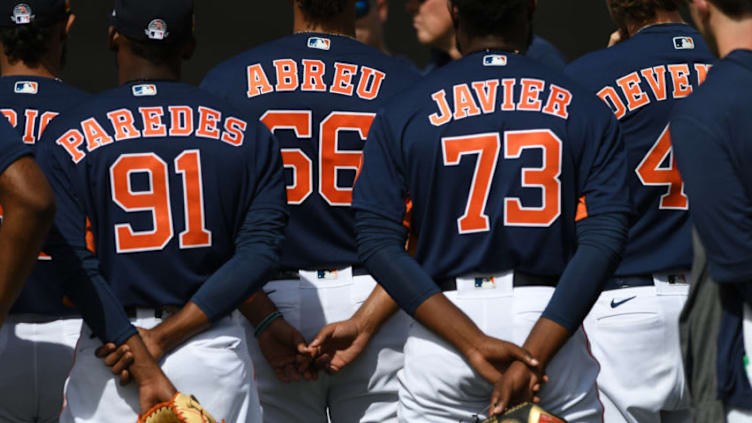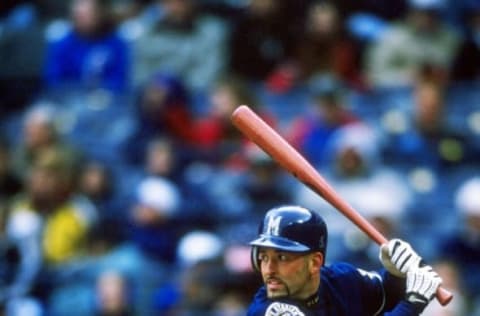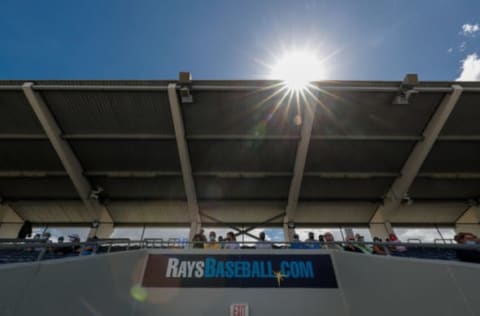Astros’ interpreter, Andrew Dunn-Bauman, gives the team a voice

It could be unconventional, it could be a stroke of luck, but interpreter Andrew Dunn-Bauman has learned a second language to advance in his baseball career.
Beyond the dugout of the Houston Astros, there is more to the team and staff. For an organization heavily invested in the development of Latin baseball players, there is a interpreter for the ball club, even though a handful of players are bilingual.
Carlos Correa and Martin Maldonado speak both English and Spanish, as we see them both join mound visits. While we have also learned that pitching coach Brent Strom is bilingual, the mastermind can hold his own in conversations with the Latin-born pitchers.
For the Astros though, there is Andrew Dunn-Bauman, who has been the team’s interpreter for the last two seasons.
Young players from Latin countries are entering this new world like mentioned before, and while classes assimilating them to American ways are sometimes in place, the pressure of learning a language with an already grueling schedule can take a toll on young players. American players don’t have to learn another language, which is something Dunn-Bauman has mentioned as he knows how comfortable it can be to talk in your first language.
Some players come to Dunn-Bauman with questions about how to say certain things in English, and if he had one wish to change the responsibilities of his current role, it would be to have more time to help Latin players that want to learn the language and assimilate into American life.
His journey to the Houston dugout is not like others, as the Milwaukee native didn’t learn Spanish until the winter of 2016.
Early Life
Like many young fans, Dunn-Bauman grew up with the game, but his connection was much closer than the everyday Little Leaguer. While hailing from Milwaukee, Wisconsin, Dunn-Bauman’s father, Michael Bauman, was a beat writer for the Milwaukee Brewers in the 1980s. From there, Dunn-Bauman remembers his first ever major-league game at the age of five-years-old, which he attended with his father.
“It was just a special feeling going into the ballpark for the first time,” Dunn-Bauman said. “There’s something magical about baseball for a lot of fans, and I think I had that connection to it, just from the first time I went.”

Growing up, Dunn-Bauman idolized the likes of Fernando Vina, a middle-infielder for the Brewers in the late ‘90s, as well as Nyjer Morgan, who electrified the ball club in the late 2000s. Milwaukee baseball wasn’t a contending team until Dunn-Bauman reached high school around 2008, but that didn’t halt his passion for the child’s game.
“I didn’t love anything more than playing baseball growing up,” Dunn-Bauman explained. “I just saw other guys that shared that kind of passion for the game, which is what I liked to see in a player.”
A Realization
Dunn-Bauman’s father taught him the intricacies of baseball, as they shared the love of the game with each other. While never playing past high school, Dunn-Bauman found himself wanting to stay connected with the game of his childhood, as he interned at ESPN radio and CBS radio in the Milwaukee area.
Here, he invested his time in the media coverage of the game, where his father and even his mother, who worked in radio, spent their careers. After one year at the University of Wisconsin Oshkosh, he transferred to the University of Wisconsin Milwaukee, where he graduated in 2015. Dunn-Bauman jumped straight into the professional sports world as a media relations intern with the Brewers.
“I was like, man, if I can make a living out of just being around baseball, it’s not a bad gig,” Dunn-Bauman said. “So, that was kind of the start of my path. It’s been five years now in pro baseball, that I’ve kind of weaved my way to where I am today.”
Although aiming to be a play-by-play broadcaster, Dunn-Bauman weighed his options and noticed how limited the positions were to crack into the industry. Even with his first employment with the Brewers, Dunn-Bauman anticipated that his internship would eventually stumble into a booth, but his start with his hometown team sparked an interest in being involved in the team side rather than behind a microphone.
“I never really took the time to think about, what if I could get involved directly with the team on a different level?” Dunn-Bauman explained. “I think it was kind of a part of my upbringing that I was just so involved in the media side of things and that was just kind of a logical next step for me at the time. So, I never really thought I wanted to get involved in baseball operations instead.”

A Change of Scenery
At the start of the 2016 season, Dunn-Bauman had already formed a relationship with newly signed assistant general manager Matt Arnold, who made the move from the Tampa Bay Rays to Milwaukee. The two formed a relationship that led to Arnold putting Dunn-Bauman in touch about a different position with the Rays, which he took as he turned more to the baseball operations side of the game as an affiliate scouting intern.
“So, the first year with the Rays was a very low level, kind of just a loose ends job,” Dunn-Bauman explained. “Anything that needed to get done around the complex kind of fell to me, actually, to the point where I was driving the team van for all of our guys every morning and had to do airport runs. Port Charlotte is where they’re affiliated, which is actually like an hour and a half, two hours from Tampa.”
While looking to get more into the operations of the game, Dunn-Bauman found himself shuttling prospects from the Dominican Republic, Venezuela and other Latin countries from the airport to their new affiliate in Florida. This sparked his interest in learning Spanish, as the then 24-year-old never learned more than the basics close to eight years earlier in high school.
“That’s actually what piqued my interest in learning Spanish originally, being so close to so many of these guys, and having absolutely no way of communicating with them, because they hardly spoke any English,” Dunn-Bauman said. “Once I started picking that up, I thought how can I utilize this a little bit at a higher level?”
A Journey to Mexico
While driving a van full of teenage Latin baseball players for a year, Dunn-Bauman was given a totally different perspective as many of these athletes entered this new world not knowing much English. This is what drove him to become fluent in the language and becoming a commodity to a major-league team, while Arnold told him to advance in the profession, “you need to learn coding or you have to learn Spanish.”
After a season with the Rays, Dunn-Bauman was left with a decision to make in the offseason. The now 24-year-old had a plan to travel and spend his winter in Costa Rica, where he looked to learn the Spanish language.
The night Dunn-Bauman bought his plane ticket to Costa Rica, a family friend called him and offered him to stay with his family in Central Mexico. Within the next 24 hours, he cancelled his flight to Costa Rica and found himself traveling to Mexico and living with a welcoming family.
“I met some of the nicest people I had ever met in my life.” Dunn-Bauman said. “They hardly spoke any English, which was, in retrospect, for the best, because I don’t think I would have accelerated my learning process as quickly as I did.”
At times, Dunn-Bauman found himself on edge while trying to interact and communicate with those around him. He could identify the times when people would seem frustrated with him, while he looked to get by with what he knew. Over time, he developed a better understanding to the point he could defend himself, but he didn’t feel totally fluent.
A Step Away From Baseball
After a winter away from the United States, Dunn-Bauman returned to the baseball world but in a new role, where he was a member of player development with the Los Angeles Angels. He now found himself more involved in the baseball operations side of the game, as he was doing video and putting together game strategy reports for the pitching staff for the Triple-A Salt Lake Bees.
The season following in 2018, Dunn-Bauman moved onto the Miami Marlins, where he worked as the video manager for the Triple-A New Orleans Baby Cakes. The Marlins wanted him to stay in the same position as a video manager but move with the team to Wichita, but the move to Wichita was the reason Dunn-Bauman decided not to return. After the offseason, Dunn-Bauman left baseball, starting a position with the University of Washington, as a bilingual research assistant where he helped report on migrant farmers and their wages.
“So for me, it kind of was just a season off,” Dunn-Bauman said. “But I couldn’t just take it totally off either financially. So it was just kind of finding other work in the meantime.”
After a few months in Washington, Dunn-Bauman returned home, as he took a position as a financial advisor for Merrill Lynch Wealth Management. While missing all of the 2019 season, Dunn-Bauman, who has an economics degree, was still exploring for a way back into the baseball world.

Here Come the Astros
While back in his hometown, working at a desk, Dunn-Bauman felt confined at Merrill Lynch, as there was no advancement in his learning that he expected. It is now early 2020, and Dunn-Bauman found a posting for Baseball Operations and Bilingual Media for the Astros, which was right up his alley.
“I remember seeing that posted, and I just went down all the responsibilities,” Dunn-Bauman said. “I was like this is the position for me to get into a sort of big league job.”
Dunn-Bauman applied and then thought nothing of it, while the idea of being under qualified as a non-native speaker, a non-Ivy School graduate and a non-former player circled his mind.
Spring training was nearing, and the Astros reached out to Dunn-Bauman and offered him the position at the beginning of the Florida season. Then, the pandemic struck.
Dunn-Bauman didn’t get the opportunity to sign his contract yet, as everyone was sent home and the world shut down. While at home, Dunn-Bauman still assisted in Zoom calls over the extended offseason. A new obstacle was formed, as the different ways that certain Latin players speak can be challenging to pick up on the first time.
Spring training is where personnel and staff can build relationships and trust with the players, but due to the pandemic, a lot of these steps were skipped which heavily affected Dunn-Bauman. The now 29-year-old didn’t have adequate time to build a relationship and understanding with the current Latin players.
“The whole process had to be sped up,” Dunn-Bauman said. “It was definitely tough from that perspective, just the pressure of forming those relationships on such short notice.”
During the first day of summer camp in 2020, Dunn-Bauman met Framber Valdez for the first time, as he was given three minutes to talk to him before translating for him in a Zoom conference. He felt petrified about his first encounter. Even though he knew Spanish and understood it well, Dunn-Bauman had to translate for someone he had never spoken with before.
“There are different brands of Spanish that our guys speak,” Dunn-Bauman explained. “The way Framber speaks is different from the way Yuli speaks.”
That narrative is different in 2021. Even with restrictions and guidelines still in effect, Dunn-Bauman has built relationships and learned the different slang that certain Latin players speak with. He has built these relationships in the clubhouse that have made it easier for him as well, while players have also corrected his pronunciation.
While now in his second season with the team, Dunn-Bauman’s favorite memory came from the 2020 postseason. Although attendance was non-existent, the game was still electrified by the players in a quiet atmosphere.
When asked what stands out most about his time with the team, “the one that stands out would have to be translating for Framber after game six of the ALCS last year, because of how much of a roller coaster of a season last year was.”
Even though coming back from three games down to ultimately lose the series, Dunn-Bauman knew it was a very special moment for the clubhouse, after game six.
More from Climbing Tal's Hill
- Houston Astros: A Lineup Change to Spark Offense
- Astros prospect Hunter Brown throws 6 shutout innings in debut
- Always faithful Astros World Series champion Josh Reddick defends the title
- Michael Conforto declines Astros’ 2-year, $30 million offer
- Alex Bregman goes off in August, leads Astros
Beyond translating for players, Dunn-Bauman does assist in the clubhouse during games, as he helps with replay challenges and other forms of analysis for the ball club.
Dunn-Bauman is optimistic of what the future holds and what his role will look like next season with the Astros.
Without an advance intern, Dunn-Bauman has picked up a lot of work on that end, but he would love to stay in Houston. His dream would be to join as a uniformed major-league staff member and assist the players in the dugout, as many translators do across the major leagues.
“I have definitely enjoyed my time here with the team, and you grow close with a lot of the guys,” Dunn-Bauman said. “And to be around such a successful organization, it’s been a privilege to me and something I have enjoyed doing.”
Next. Family & baseball: Jose Puentes' journey to coaching professionally. dark
The Picture
To close out the ballad of Andrew Dunn-Bauman, it is appropriate to bring up his claim to fame this past spring training:
Safety first, kids. ☀️😎 https://t.co/HjvaZHa3PU
— Andrew Dunn-Bauman (@ADBmke) February 23, 2021